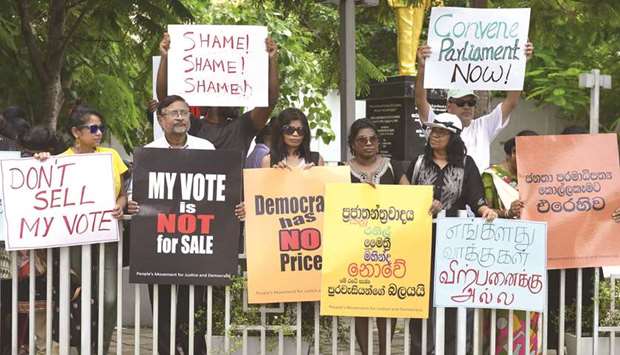Sri Lanka President Maithripala Sirisena announced yesterday that parliament would reconvene a week later than expected, prolonging a bitter power struggle that has crippled the country.
Sirisena had on Friday promised that he would recall parliament on Wednesday to decide between two rivals claiming the lawful right to head Sri Lanka’s government.
The nation of 21mn has been gripped by constitutional turmoil since Sirisena sacked his former ally, prime minister Ranil Wickremesinghe, and his cabinet on October 26 - appointing former president Mahinda Rajapakse in his place.
Sirisena shut the legislature a day after the sacking, preventing a vote demanded by Wickremesinghe to prove his majority.
Yesterday the expected recall was pushed back until November 14.
“I do by this Proclamation summon Parliament to meet at the Chamber of Parliament... on the fourteenth day of November, 2018 at 10.00 am,” Sirisena said in an official proclamation.
The United Nations had led a chorus of international voices demanding an early resumption of parliament to end the constitutional crisis that has paralysed the administration and caused economic upheaval.
Wickremesinghe says his dismissal was illegal as he commands a greater majority in parliament than former strongman Rajapakse.
The announcement by Sirisena came as the country’s main Tamil party urged him to end the worsening political crisis.
The Tamil National Alliance (TNA) could tip a vote to decide between the two rivals and has already said it would vote against Rajapakse in a no-confidence motion when parliament
reconvenes.
Both men have been marshalling numbers behind the scenes, worrying civil society groups who protested Sunday in the capital Colombo against the horse-trading.
TNA legislator Dharmalingam Sithadthan said the president had called the Tamil legislators to a meeting Wednesday - the same day parliament was originally expected to reconvene.
“We have asked the president to immediately call parliament and end this crisis,” Sithadthan said.
Wickremesinghe’s United National Party (UNP) risks losing legislators to Rajapakse’s camp as the days drag by.
Some members of his party have alleged they were offered portfolios and huge amounts of money to switch allegiances.
Seven MPs have already switched sides and been granted portfolios under Rajapakse’s new administration.
The Sunday Times of Colombo newspaper described the sacking of the prime minister as “sheer political expediency” and outside the law.
The state-run Sunday Observer, now controlled by Rajapakse loyalists, defended the change of government but acknowledged the crisis should be resolved.
According to latest counts, Wickremesinghe now has 102 MPs from the 225-seat assembly after another defection while Rajapakse and Sirisena also have 102.
Most of the remaining 21 MPs - including the TNA - are set to oppose Rajapakse, observers said.
The Sri Lanka Muslim Congress (SLMC) party, which has seven lawmakers, said its members had also rejected offers to join the Sirisena-Rajapakse camp.
Meanwhile, thousands of supporters continue to occupy Wickremesinghe’s official residence saying they would resist any move by Sirisena to evict their prime minister.

Activists hold placards during a demonstration in Colombo yesterday.
